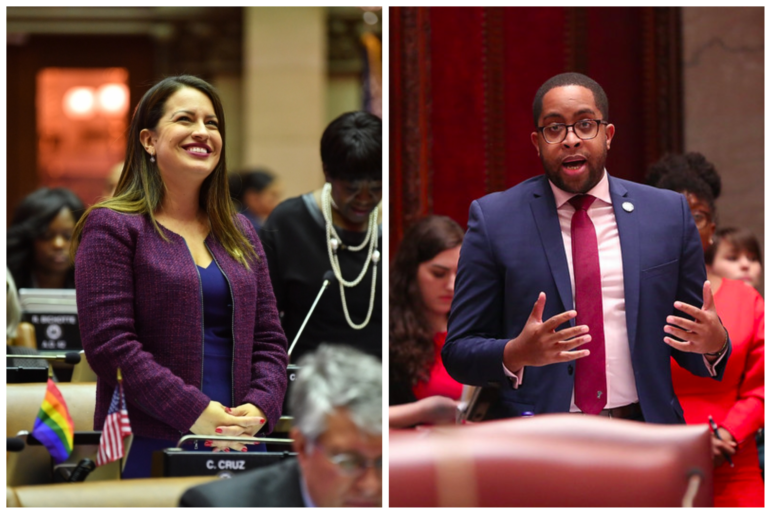‘Across the state, 1 in 7 people – 2.3 million New Yorkers – have criminal records. They are denied jobs, housing, education, life insurance, loans, child custody, licensure and more. The lifelong barriers they face perpetuate poverty and racial inequality.’

NYS Assembly/NYS Senate
Assemblymember Catalina Cruz and State Sen. Zellnor Myrie introduced the Clean Slate bill earlier this year.Expungement changes people’s lives. It opens doors to jobs, housing and education, and allows people with criminal records to truly rejoin their communities. It strengthens our economy and could be a powerful tool as we struggle to rebuild from the pandemic. I have been happy to see it included in recent reforms, but I fear we are missing the big picture. Expungement isn’t about the crime. It is about the endless punishment that follows a conviction, decades after your sentence is served. To truly reform the system we need to move beyond the narrow approach of expunging convictions only for specific offenses and create expungement for everyone.
The marijuana legalization law is the most recent reform to include automatic expungement when repealing certain offenses. The first was the 2019 marijuana decriminalization law which created automatic expungement for two low-level offenses. Then, earlier this year, loitering for the purposes of prostitution was finally repealed, and the convictions for that offense were added to the list. Now, we have a new list of marijuana offenses that will be automatically wiped off of people’s records. This is progress. But it is piecemeal.
Across the state, 1 in 7 people – 2.3 million New Yorkers – have criminal records. They are denied jobs, housing, education, life insurance, loans, child custody, licensure and more. People with criminal records make on average almost $500,000 less in their lives than those without convictions. The lifelong barriers they face perpetuate poverty and racial inequality. These problems do not exist only in relation to marijuana and loitering offenses. Police and prosecutors target Black and brown people disproportionately for all offenses, creating an entire class of people that is kept down by the perpetual punishment of a conviction. We need a broad solution that creates opportunities for all New Yorkers, regardless of their convictions. That solution is Clean Slate.
 CityViews are readers’ opinions, not those of City Limits. Add your voice today!
CityViews are readers’ opinions, not those of City Limits. Add your voice today!
The Clean Slate bill introduced earlier this year by Senator Zellnore Myrie and Assemblywoman Catalina Cruz would automatically expunge the records of everyone who has served their time. If you haven’t had any convictions for a certain number of years and aren’t on parole, probation or the state registry, you can finally move on with your life. It will not end poverty or systemic racism, but it will do more to help people get back on their feet than all of the expungement reforms of the last few years combined.
As an attorney I have witnessed the devastation caused by a criminal conviction, even for a low-level offense. I’ve met with hundreds of people who just want to support their families and contribute to their communities, but they are stopped at every step. They don’t deserve to suffer. They don’t deserve to be marked forever by their past.
I urge you to listen to the stories of people still struggling to get on their feet years after serving their time. Think about why our society puts so many barriers in people’s way and what purpose it serves. The barriers are not there to keep us safe. In fact, excluding people from participating in society makes us less safe by perpetuating poverty and increasing the likelihood that people will commit crimes out of financial desperation. So the inescapable conclusion is that these barriers are there simply to maintain wealth, power and the status quo.
We use the term “collateral consequences,” but there is nothing collateral about them. They are part of the punishment. They are intentional. They are lifelong barriers to full participation. They are an endless sentence to poverty. They are at the very root of the systemic inequality that we must address. Our current application-based system doesn’t do enough. Piecemeal, charge-specific expungement doesn’t do enough.
We are so close to understanding what needs to happen to truly create systemic change. To address decades of racially-targeted policing. To give people opportunities to support themselves. To rebuild communities. To give all people a true Clean Slate.
Emma Goodman is a staff attorney with the Criminal Defense Practice’s Special Litigation Unit at the The Legal Aid Society.









One thought on “Opinion: After Cannabis Legalization, New York Needs an Automatic Expungement Law”
It seems to me that much of the criminal punishment system perpetuates an enslaved class of human beings. The ancient ideas of eternal retribution for past wrongs, sees no power in restoration or forgiveness and any hope for the future. Clean Slate wipes away the stigma of past offenses that prison has bled the coffers of the state and the spirit dry. The Rev. Robert Stuhlmann